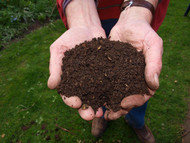Few of us have perfect soil and by adding compost, or a soil improver you will help to provide the optimum growing conditions, providing you with bigger and healthier plants.
There are a few different types of compost, but the main ones are:
Multi or all-purpose compost – affordable and commonly used. This type of compost can be used across your garden; in your garden borders, your planters/containers and in your hanging baskets, which is why it is so popular.Peat based compost – this is made from peat mixed with other ingredients such as fertiliser, grit or sand, vermiculite or perlite, wetting agents, and lime. Peat is very good at holding water and retaining nutrients. It is very good for improving the quality of both garden and potting soil and really bringing seeds and plants on, however it is not considered to be sustainable or environmentally friendly.Peat free compost – made from base ingredients such as wood fibre, composted bark, coir or green compost. This is a popular choice for those trying to reduce their impact on the environment. Some things to be aware of though; plants in peat free compost can look well-watered on the surface but be dry at the roots. Most peat-free composts will contain a small amount of fertilisers, but this will run out in usually 4-6 weeks. Consider adding a controlled-release fertiliser to sustain your plants through the growing season. Loam based compost – often soil-based and made from a mixture of loam, sand or grit and peat with increasing amounts of plant foods added. The soil that forms part of this compost is very stable which is great for plant health and development. In addition, Loam based composts help to avoid fluctuations in water and nutrient content. They can however be more expensive due to the labour involved. They are also heavier because of the soil content so transport costs are higher which adds to the final cost.When choosing your compost look for:
Good structure and aeration for encouraging strong root development and healthy plants.
A medium-crumbly texture is ideal; composts that are too fine are prone to water logging, while those that are too coarse tend to need more frequent watering.
The right balance of nutrients for your needs. For potting you will need a compost that has the right nutrients to support the development stage, whereas a multipurpose compost can support plants at all growth stages.
Think about the plants you want to grow and the type of soil they are happiest in. Acid loving plants such as rhododendrons, azaleas, heathers and camellias need to be planted in a specialist ericaceous compost. These plants will struggle to grow if your soil is alkaline.

